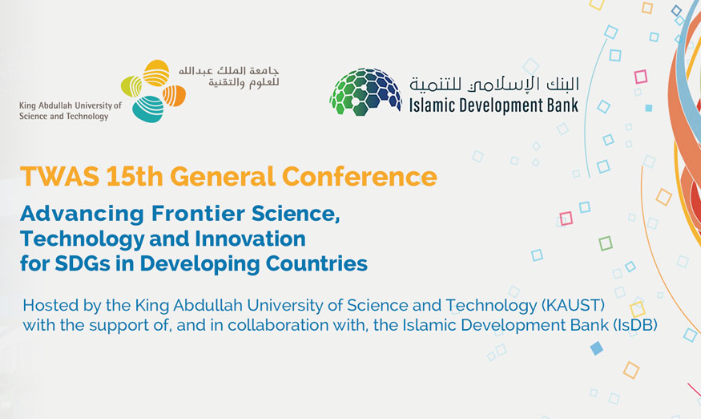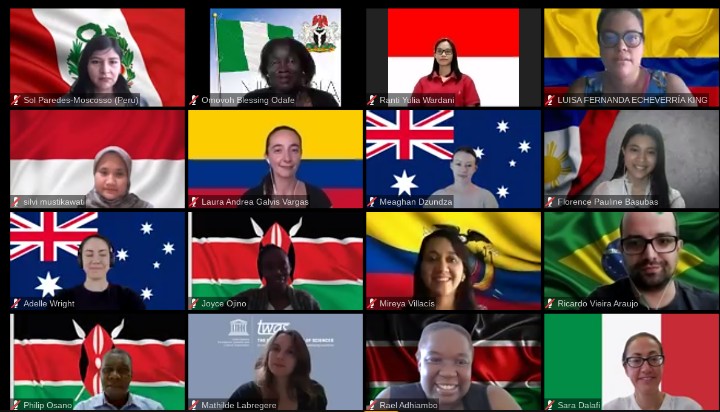In 2021, the global science community faced some daunting challenges, the most prevalent being the continuing COVID-19 pandemic and the spread of the Delta and Omicron variants. But there were also glimmers of hope, as scientists worked hard to find answers and help restore a sense of balance to life everywhere.
UNESCO-TWAS was part of these efforts, as always tirelessly engaged to strengthen science capacity in the global South, and bring together research institutions and policymakers in the spirit of collaboration and the betterment of all. Among the highlights of 2021 were highly attended online events and several programmatic initiatives in pursuit of the Academy’s mission to nurture scientific development in regions of the world where it’s needed most.
Here are just a few:
 The main highlight of the year was TWAS Fifteenth General Conference, convened from 1–4 November and held entirely online and a year later than planned, due to COVID-19. The meeting was originally planned to take place in person in Jeddah, the second-largest city in Saudi Arabia. Nevertheless, the event drew an international audience of about 600 participants per day from 80 countries, including researchers and policy experts from developing and developed regions. It was organized by the King Abdullah University of Science and Technology in collaboration with the Islamic Development Bank—both important TWAS partners based in Saudi Arabia.
The main highlight of the year was TWAS Fifteenth General Conference, convened from 1–4 November and held entirely online and a year later than planned, due to COVID-19. The meeting was originally planned to take place in person in Jeddah, the second-largest city in Saudi Arabia. Nevertheless, the event drew an international audience of about 600 participants per day from 80 countries, including researchers and policy experts from developing and developed regions. It was organized by the King Abdullah University of Science and Technology in collaboration with the Islamic Development Bank—both important TWAS partners based in Saudi Arabia.
The conference also included about 50 eminent speakers on science and science policy across a ministerial session, award ceremonies, TWAS Medal Lectures and three symposia, as well as a Nobel Laureate, globally renowned chemist Jean-Marie Lehn, who spoke on the impact and prominence of modern chemistry in a keynote lecture.
The Conference also adopted the Jeddah Declaration as its outcome document, addressing important issues such as COVID-19, open science, inequality, energy, gender equity, science literacy, biodiversity and digital inclusion. Furthermore, the Academy elected 58 new TWAS Fellows, expanding the total membership of UNESCO-TWAS to 1,343.
Also, in the months building up to the meeting, UNESCO-TWAS held a five-part webinar series featuring its distinguished awardees. These successful webinars were livestreamed on TWAS YouTube channel and were a first-of-its-kind success for the Academy, demonstrating its movement into publicly held online events that include question-and-answer sessions with registered attendees.
 UNESCO-TWAS also partnered with the American Association for the Advancement of Science (AAAS) to organize the Eighth AAAS-TWAS Science Diplomacy Course, which was held from 30 August to 3 September and was all-virtual for the second time. The five-day course included talks from experts in the science diplomacy field. It also featured break-out sessions in which participants collaborated to examine science diplomacy in a series of talks and simulations.
UNESCO-TWAS also partnered with the American Association for the Advancement of Science (AAAS) to organize the Eighth AAAS-TWAS Science Diplomacy Course, which was held from 30 August to 3 September and was all-virtual for the second time. The five-day course included talks from experts in the science diplomacy field. It also featured break-out sessions in which participants collaborated to examine science diplomacy in a series of talks and simulations.
Furthermore, Science in Exile, an initiative to enhance the work and lives of at-risk, displaced, and refugee scientists globally, saw major developments. Accomplishments included the launch of a mapping survey of organizations that provide support to, and opportunities for, such imperiled scientists, as well as the establishment of Science in Exile’s Interim Steering Committee, and the launch of a podcast series.
UNESCO-TWAS also took part in and initiated numerous important capacity-building programmes. Among these accomplished was the third edition of its yearly postdoctoral programme for early-career researchers from the least developed member countries of the Islamic Development Bank (IsDB). The 2021 edition was called TWAS-IsDB Postdoctoral Fellowship Programme for Women, and allowed participation only of women candidates, with the aim to foster gender equality and the participation of women in science.
Other accomplishments included the programme dedicated to early-career scientists from least developed countries (LDCs), jointly organized by UNESCO-TWAS, the International School for Advanced Studies, in Trieste, and Accademia Nazionale dei Lincei, in Rome.
The United Nations Technology Bank for Least Developed Countries and the International Centre for Genetic Engineering and Biotechnology (ICGEB) also partnered with UNESCO-TWAS to launch a new programme to build scientific development in the LDCs: the ProgrAmme of CollaboraTions with LDCs (PACTs). This programme offers exchange visits in biomedicine, biotechnology and agriculture to early-career scientists from 46 LDCs. The visits last up to six months and take place at the ICGEB laboratories in Trieste, Italy; New Delhi, India; and Cape Town, South Africa.
Finally, UNESCO-TWAS launched two videos that bring ongoing science in the South to light. One, titled “TWAS - Empowering scientific research in Nepal”, shows the value of turning to local professionals to save energy, and endorses capacity-building in LDCs. In the second, TWAS Fellows, research grant awardees, and members of the TWAS Young Affiliates Network from over 30 countries came together to share what the Academy meant to them while speaking their native languages.
Sean Treacy

